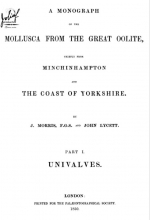Добрый день, Коллеги. Важное сообщение, просьба принять участие. Музей Ферсмана ищет помощь для реставрационных работ в помещении. Подробности по ссылке
Mollusca from the great oolite, chiefly from Minchinhampton and the coast of Yorkshire. Part 1. Univalves / Моллюски из большого оолита, главным образом из Минчинхэмптона и побережья Йоркшира. Часть 1. Одностворчатые
The authors of the present Monograph, after due consideration of the materials at their disposal, have thought fit to limit their illustrations to the Testacea of the Great or Bath Oolite; a term under which they would include the series of beds situated between the Fullers-earth strata upon which they repose, and the Bradford clay to which they are subjacent. To have enlarged the plan, so as to include the Testacea of the Corn-brash and Forest marble, would doubtless have been more comprehensive; but in the present state of our knowledge, the advantage would have been rather apparent than real. It will be found that the very few univalves which have been assigned to those deposits are almost without exception contained likewise in the Great Oolite, and will be found in the Monograph. It is, moreover, not impossible, that at some future time a series of univalves may be obtained from the Cornbrash, or Forest marble, differing specifically from those of the Great Oolite, in which case a separate Monograph, or an appendix to the present one, might be given.
It is much to be regretted, that collections of shells should have been procured from so few situations in the long course of the formation in this country; and when it is remembered, that the Great Oolite constitutes a member of that series of secondary rocks 'which first engaged the attention of geologists, some surprise will mingle with our regret. The defect, however, would appear to be of easy explanation. The shells do not lie upon the surface, or become separated from the matrix by the action of the weather; they are to be procured only by carefully working away the investing stone when practicable, which is not always the case: there are likewise large areas constituting, probably, the greater portion of the formation, which are altogether destitute of organic remains, or contain only a finely comminuted shelly drift; the areas containing assemblages of well-preserved shells, would appear to be of small extent, and the presence of several of these in the vicinity of the residence of one of the authors, together with the great profusion of undescribed testacea which they have produced, have constituted the principal inducement to the present attempt of describing them; these favorable circumstances have enabled them to ascertain the position and vertical range of the species with a greater degree of accuracy than would otherwise have been possible. <...>




